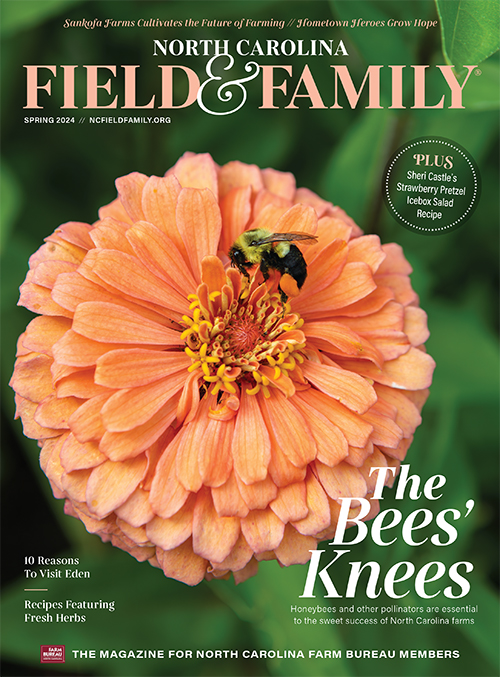Atlantic Caviar & Sturgeon Produces Culinary Delicacy
Atlantic Caviar and Sturgeon produces the culinary delicacy in the Old North State and benefits N.C. State University.
Farm Bureau |
Yadkin County Farm Bureau member Joe Doll used to fly cargo planes around the globe, giving him the opportunity to taste cuisine not usually found in North Carolina. That travel allowed him to refine his palate for caviar.
“I got a taste of caviar when I was in Russia while we were passing through,” Doll says. “As other people noticed and I noticed, caviar started to be a little harder to get after the Soviet Union broke up.
“One trip out, it struck me that it might be interesting to see if we could do this on a farm as agriculture,” he adds.
That’s when Doll joined part of an alliance that formed LaPaz Group, the parent company of Atlantic Caviar & Sturgeon, which has its operation in what’s known as Happy Valley in northeast Caldwell County. Access to fresh water and a temperate climate allows Atlantic Caviar & Sturgeon to produce delicacies that rival what comes from Russia, long known for its high-quality caviar and other fish offerings.
“I introduced the thought to a few of my friends, and we became enamored with it,” Doll says.
“I guess we thought it would be a nice hobby that would take us into retirement, but it’s become quite a bit more than just a hobby.”

Details of Operation
Atlantic Caviar & Sturgeon obtained its first batch of fish in 2006. Now seven years later, the operators have about 16,000 fish contained in a 32-tank system that holds 20,000 gallons of water in each tank.
Doll says the well water the operation gets at its property is almost constantly re-circulated to keep it clean, reducing the need for a lot of fresh water.
“Water is instrumental in keeping fish alive,” Doll says.
Doll says the typical temperature range in Caldwell County – usually somewhere between 50 and 90 degrees for most of the year – provides good conditions for the fish to mature.
“The fish can handle it quite well,” Doll says.
A staff of six employees maintain the fish and package the product. It took some time for the fish to mature enough for any caviar or sturgeon meat to be sold, but the operation began to sell its products during the second quarter of last year.
“This farm is engineered to do 1½ to 2 tons of caviar per year, which is quite a lot of caviar when it sells by the gram or by the ounce,” Doll says.
 What Makes Good Caviar
What Makes Good Caviar
Beluga caviar from Beluga sturgeon from the Black Sea in Russia is considered the best caviar in the world, but it is in short supply as a result of overfishing and habitat destruction. Doll says the caviar Atlantic Caviar & Sturgeon can produce is approaching the quality of Beluga caviar.
“It should be very buttery tasting. It should be pretty crisp. Colors can vary, but texture really shouldn’t. It shouldn’t be mushy or anything like that. The shell should actually have a little pop to it when you taste it,” Doll says.
“There are various grades of caviar. It can go from very poor to extremely good. We seem to be somewhere in the very good range. We hope we can continue to do that,” he adds.
Connection to N.C. State
One of the company’s founders, Bill White, died of cancer in 2008. White left his portion of ownership of the LaPaz Group to N.C. State University and provided funding to complete the facility and operate the company until it is self-sustaining.
Two North Carolina Cooperative Extension specialists, Jeff Hinshaw and Tom Losordo, have been instrumental in refining the process. The university is excited about how the unusual donation could be beneficial. As now planned, Hinshaw says Atlantic Caviar & Sturgeon will eventually be able to produce enough product that could generate up to $1 million annually for university agriculture programs.
Hinshaw envisions a “whole gamut of research” generally involving optimizing the environment in which fish are raised and live. He envisions research on subjects ranging from understanding sturgeon tolerance to a variety of water chemistry parameters to nutritional questions and optimal tank dimension and shape, even the lighting in the buildings.
Future Prospects for Operation
Since it’s only been a little more than a year that Atlantic Caviar & Sturgeon has been selling its product, Doll is upbeat about the future for the operation pushing not only its caviar to market, but sturgeon meat as well.
“It’s a very slow thing, probably why it’s risky and pretty hard to do,” Doll says. “It’s quite a lengthy process, but once you reach that point, if you’re still pretty lucky and you don’t have any great calamities, you’ll be OK. We’ve reached that stage in the last year and half and started to harvest.
“We’re quite excited,” he adds. “This farm will grow as more fish come of age. We’re on the up slope at this point. We haven’t quite reached the steady state yet for performance. We think there is real potential here.”
Almond-Coated Sturgeon with Summer Salsa
For the Salsa:
2 cloves garlic
6 – 7 mixed mini peppers (yellow, red and orange)
1 Vidalia or other sweet onion
4 medium tomatoes
10 – 15 fresh mint leaves
2 – 3 tablespoons red wine vinegar
Salt and pepper
With the food processor running, drop in garlic cloves and peppers. Stop the processor, add onions, tomatoes, mint, vinegar, and salt and pepper to taste. Pulse 20 times. Set aside.
For the Fish:
6 sturgeon portions, 4 to 5 ounces each
lemon pepper
1/4 cup olive oil
3 tablespoons unsalted butter
1 cup almonds, slivered
Season sturgeon fillets with lemon pepper. Heat olive oil and butter in large skillet. Pan sear fish in hot olive oil/butter mixture—about one minute on each side.
Cover bottom of foil-lined baking pan with 1/2 cup slivered almonds. Place fish in pan, on top of almonds. Cover sturgeon with remaining almonds. Bake at 375 degrees for 30 minutes.
Serve with salsa.
Recipe Courtesy of Louis Pugh, Atlantic Caviar & Sturgeon


